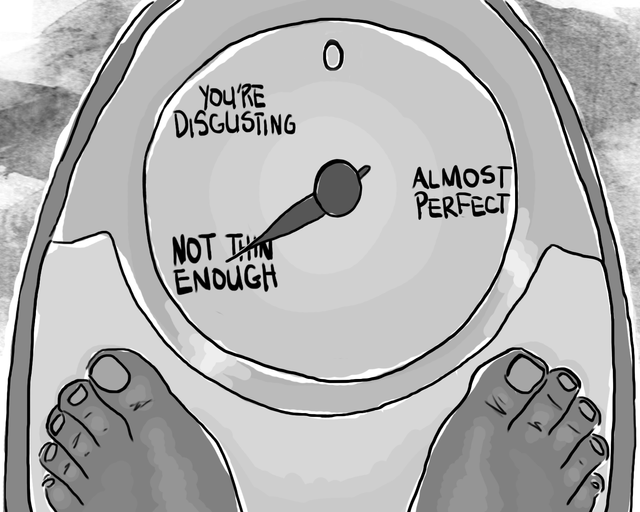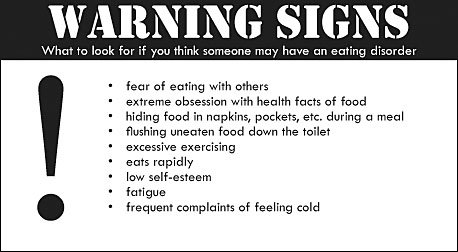Alice's eating disorder - An educational story
Alice, a tall, slightly chubby 17 year old student, began dieting when she was 10. By the age of 12 she had graduated to binging and vomiting – a pattern which soon dominated her life. At the time, she was a competitive swimmer who had to be thin to remain on the team.
Before a training session, Alice would go without eating for several days to get her weight down. But then, an uncontrollable urge to eat would send her to the kitchen – usually late at night when her family was asleep – where she would raid the cupboards and refrigerator for desserts. She later recalled that at a single sitting she might consume an entire pie, a litre of ice cream and whatever else she could find, stopping only when she was so full that her stomach was painfully distended. By then, she would feel overcome with remorse and would spend an hour or more forcing herself to vomit.

The adolescent started taking her mother’s diet pills, even though they made her feel jumpy. Occasionally, she took a handful of laxatives as well.
By the time she was 15, Alice was binging and purging at least four times a week. Even so, she slowly gained weight. At 16, she weighed 81 kilograms, while standing 1075 metres tall.
By then almost every waking thought was centred on food and her weight.
By crash dieting she managed to lose 14 kilograms. She then dropped out of school for five months, staying at home and going through several binge-vomit cycles a day. In desperation, her parents admitted her to a hospital-based programme for the treatment of eating disorders. While there, she became depressed and attempted suicide by cutting her wrists.
Psychiatrists working with Alice generally described her as neatly dressed, well orientated and rational. After an interview with her, one doctor wrote: “She realizes she has a serious problem with binge eating, but feels rather hopeless about getting the behaviour under control.”
Summarizing Alice’s eating problems, the psychiatrists called it a classic case of bulimia and recommended both individual psychotherapy and group therapy with other bulimics, to help her achieve a normal eating pattern and to become more comfortable with her body. Her success is reflected in the fact that her average weight now ranges between 68 and 72 kilograms – only slightly above her ideal weight of 66 kilograms.

Anorexia nervosa typically begins during early adolescence when a young girl becomes convinced that her maturing body is fat. Anorectics tend to be high achievers and are often described as obedient, ideal daughters. Some psychiatrists theorize that their eating behaviour represents one aspect of life they feel they can control.
A person with anorexia chronically undereats, becoming thinner and thinner and, in extreme cases, literally starving to death, while remaining firmly convinced that she is overweight. Many anorectics expend a great deal of time and energy in preparing food, which they serve to others while eating only tiny amounts themselves. In addition, some of them have ritualistic eating habits, such as cutting food up into tiny pieces or arranging it very precisely on the plate.
The bulimic goes on periodic food binges, gorging on a large quantity of food in a short period of time. These binges are followed by purges, in which the individual forces vomiting and/or uses medications to stimulate vomiting and bowel movements. Some bulimics also abuse diuretics to increase the excretion of body fluids. Others abuse amphetamines to prevent weight gain.
Bulimics and anorectics are secretive about their eating habits and typically deny that they have a problem. They tend to be obsessive about exercising. Many have low self-esteem and some bulimics also exhibit other addictive behaviour, such as alcohol abuse and compulsive shoplifting.
What causes these eating disorders is unknown, but some blame problematic family relationships. However, it is suggested that eating stem in part from brain chemical and hormonal imbalances.
Anorexia and bulimia are potentially fatal diseases. Anorectics can literally starve themselves to death, while bulimics have a high suicide rate. Metabolic and other changes brought about by their erratic eating behaviour increases their risk of heart disease.


This was my story. Been battling with my weight since I can remember. Always had a bad body image and I'm still battling with this mental disease as well has trying to lose weight to this day. It's been a journey, but I'm learning to enjoy the journey.
To listen to the audio version of this article click on the play image.

Brought to you by @tts. If you find it useful please consider upvoting this reply.